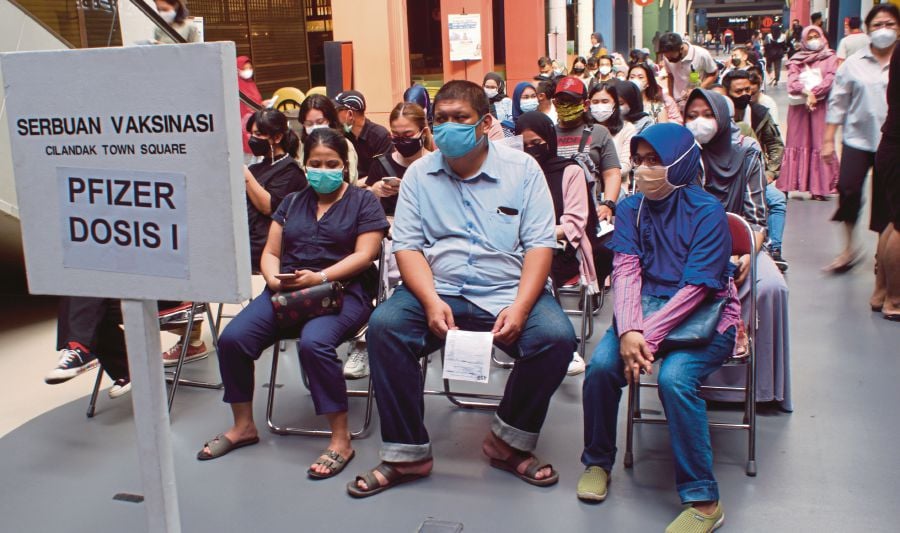In fighting a pandemic, one of the weapons needed is data. Not just accurate data but also quickly obtained and analysed to support the next step.
The reason is that the pace of the Covid-19 pandemic always races with the speed of data input.
For instance, if the data shows that the number of people infected in the past month amounted to 4,000, then health workers would have to take different steps compared with if the total of people infected was 12,000.
This means that in the second case, three times the effort must be prepared compared with the first.
Apparently, the speed of
inputting data on active cases
in Indonesia still needs improvement. The following figures
are proof.
One of the available data shows that from 22,000 active cases in Java and Bali, up to Tuesday, there are still six provinces that have not updated their status for more than 21 days.
This can be seen in the evaluation document for the implementation of the Java-Bali restrictions on community activities, published by the Indonesian Health Ministry, on Wednesday.
From all regencies/cities in Java-Bali with the most unreported active cases for more than 21 days, Central Java has 61.4 per cent of such cases. Up to Tuesday, as many as 15,221 active cases in Central Java have not been updated in that period.
Among the cities/districts that contributed to high data "debt" (active cases that have not been updated for more than 21 days in Central Java) are Brebes (1,212 cases), Boyolali (979), Sragen (943) and Magelang (749).
Semarang, as the capital of Central Java, also has 567 active cases that were not reported for more than 21 days, other than another 2,000 empty data which also increased the number of unreported active cases within that period.
West Java also has active cases that have not been updated within 21 days — totalling 5,421 cases (or 26.7 per cent), followed by East Java (1,515), Bali (424), Yogyakarta special province (325), and Banten (37).
Out of the seven provinces in Java-Bali, only Jakarta has no "debt" in presenting case numbers for more than 21 days. This means that all of the active cases in Jakarta were input results before 21 days, which amounted to 7,047 active cases.
Thus, with this single updated data, the government under Governor Anies Baswedan can take action, worry less about follow-ups (additional) active cases. Up to Tuesday, all existing figures are current and there are no active cases in DKI Jakarta, whose status has not been updated during that time.
Apart from Jakarta, with proven accurate and fast data management, we need to worry about areas which are not ready in data handling.
The 22,000 active cases which have not been updated for 21 days can be worrying, as many occurrences can happen that time. As mentioned, regional authorities can take wrong actions in making policies if the existing data is not up-to-date.
Communication experts have advised that threats, particularly during a pandemic, could be a good way to generate proactive, healthy and protective actions by those who receive the message of risk.
Therefore, the accurate and quick data provided by the Jakarta government will be a solid foundation of policies and Covid-19 responses. It also gives the Jakarta administration and its residents a sense of readiness.
Another achievement is the positivity rate, which is the percentage of positive Covid-19 test results in an area. Up to Tuesday, Jakarta has reduced the positivity rate to 6.7 per cent, far below than that of the other provinces like Banten with 10.6 per cent, West Java with 15.9 per cent, Central Java with 16.8 per cent, East Java with 17.9 per cent, Bali with 19.3 per cent and Special District of Yogyakarta, the highest, at 22.3 per cent.
In fact, Jakarta's positivity rate of 4,6 per cent in the last week of August reached below the safe limit set by the World Health Organisation, at not higher than five per cent.
When Jakarta was hit by the second wave in June-July, the positivity rate skyrocketed to 40 per cent. Therefore, the current figure of 6.7 per cent indicates that the situation is much better, although it still needs to be suppressed.
However, we still hope that the Indonesian capital will not only win in the race for data accuracy management, but also become an example in efforts to free us from this pandemic.
Jakarta is the mirror for Indonesia, while Indonesia itself must be able to become a good example for the world, especially in fighting this deadly virus.
The writer is a medical doctor and lecturer at the Institute for
Communication and Business LSPR, Jakarta





